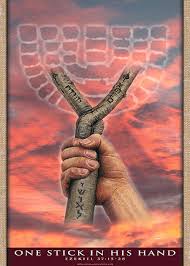A Last Days Prophecy
Deuteronomy 4:25–32, Apostasy, exile, enslavement, repentance and regathering of lost and scattered Israel to the Promised Land in the last days. This passage deals with the exile and return of the Israelites. Because of syncretism with the idolatrous practices of the nations around them, YHVH prophesied that the Israelites would be scattered among the nations of the world. Conversely, YHVH prophesies that “in the end of days” (verse 30)—a metaphor for “the last days” or “the end of the age”—he would hear their pleas for help, have mercy on his people, and remember his covenant with them. According to some noted Jewish sages, “the end of days” refers to the period just before the coming of Messiah, and this repentance is the same as that which Moses mentions later in 30:1–2 (The ArtScroll Stone Edition Chumash, p. 965). Here are some additional quotes from some noted Jewish scholars on the subject of Israel returning to YHVH from its exile among the nations:
The future King Messiah (Messiah Son of David) will not only redeem the Jews from exile, but will restore the observance of the Torah-commandments to its complete state, which will only be possible when the Israelites are living in the Land of Israel. At this same time, “there will be an ingathering of the dispersed remnant of Israel. This will make it possible for the Davidic dynasty to be reinstated and for the observance of the Torah and its mitzvot [commandments] to be restored in its totality” (I Await His Coming Every Day, p. 35, [see also p. 38 quoting Rambam] by Menachem Schneerson, emphasis added). According to the Rambam (also known as Maimonides) in his Thirteen Principles of the Jewish Faith the resurrection of the dead will occur just after the coming of the Messiah and that the resurrection of the dead is a key element of the Final Redemption (ibid., p. 59).
The Jewish sages recognize that the ingathering of the exiles, including the ten tribes of the Northern Kingdom, will also return, be reunited with Judah and that the whole house of Israel will serve YHVH together (Ezek 20:32–37, 40–42) (Mashiach—the Principles of Mashiach and the Messianic Era In Jewish Law and Tradition, pp. 20-22, by Jacob Immanual Schochet quoting from Sanhedrin 110b; Bamidbar Rabba 16:25).
The ArtScroll Bereishis/Genesis Commentary, vol. 1(b) states in its commentary on Genesis 48:19 regarding Ephraim: “R. Munk explains: ‘while it is true that the dispersion [of the descendants of Ephraim and Manasseh] was caused by the unfaithfulness and sinfulness of Ephraim’s descendants (Hos 7:8ff), Jacob’s blessing was not in vain for “they will return to God” and will have their share in the world to come (Talmud Sanhedrin 110b).’ And R. Eliezer adds: ‘Even the darkness in which the Ten Tribes were lost will one day become as radiant as the day’ (according to the version of Avos d’Rabbi Nosson 36). And in the perspective of history, did not these exiled children of the Patriarchs enlighten the nations among whom they were scattered? They did so by teaching their conquerors the fundamental ideas of the knowledge and love of God, ideals they had never forsaken. Hence they too have a messianic vocation and their Messiah the Maschiach ben Yosef, Messiah son of Joseph (Talmud Succah 52a), also called Messiah son of Ephraim (Targum Yonasan on Exodus 40:11), will play an essential role in humanity’s redemption, for he will be the precursor of the Maschiach ben David, Messiah Son of David. It is therefore not surprising to find that the prophet Jeremiah (3:12) speaks affectionately of Ephraim. In this light, Jacob’s words, ‘his offspring will fill the nations,’ assume the significance of blessing” (pp. 2121–2122).
The regathering of not only the Jewish people (largely from the tribe of Judah), but Israelites from the other eleven tribes is predicted by Yeshua and the apostolic writers as well (see Acts 3:21; Matt 10:6; 15:24).
Now note how the following phrases or concepts are used in Scripture, who they relate to, and how this relates to the statements of the Jewish sages and to our text under consideration as pertaining to Israel (including both the houses of Israel (i.e. Ephraim/Samaria or the Northern Kingdom and Judah or the Southern Kingdom) being scattered among the nations for their disobedience to YHVH, and then their being regathered and restored as a united kingdom and obedient people under the rule of King Messiah:
- Dispersed: The house of Judah was dispersed out of the Land of Judah into Babylon because of her spiritual adultery (Isa 11:12; 56:3, 6–8; Ezek 37:21; John 7:35).
- Far and Near: Solomon prophesied the Israelite/Ephraimic exile, that Judah would be exiled to a near country (Babylon) and Ephraim would be exiled to a far country (Assyria) (1 Kings 8:46; see also Dan 9:7). Paul makes reference to the purpose of his ministry being to preach peace to those who were afar off and them that are near that through Yeshua both may have access through the Spirit unto the Father (Eph 2:16–17).
- Gather/Regather(ing): Ezek 34:13; 36:24; Isa 56:8
- Israel, Assimilated Into the Nations: Isa 7:8: Hos 1:10; 4:1,6; 5:3; 2:23; Deut 28:64;
- “Lost” (assimilated, but not lost): Hos 8:8; Amos 9:9; Deut 28:64; Hos 5:3
- Mixed With the Nation: Ephraim mixes himself with the nations: Hos 7:8; 8:8
- Outcasts: The House of Israel are outcasts (YHVH cast them out of the Land of Israel for their spiritual adultery, Isa 11:12; 56:8)
- Return: In the last days, the sons/children of Israel (both Ephraim and Judah) shall return to YHVH and his Torah (Hos 3:5).
- Scattered/Sown (Jezreel): YHVH would sow or scatter the descendants of the House of Israel (Ephraim) (throughout the nations, Hos 1:4).
- Scattered Sheep of Lost Israel to Return By YHVH’s Hand: Ezek 34:11,16
- Scattered: Ephraim scattered over the face of the whole earth, Ezek 34:6,12; 36:19; 37:21; John 11:52. In regards to Deuteronomy 32:26 which says, “I said, I would scatter them into the corner …” The ArtScroll Stone Edition Tanach Chumash comments, “This refers to the exile of the Ten Tribes, who were scattered to an unknown place where they have never been heard from again. On the phrase of the same verse, “I would make the remembrance of them to cease from among men…” the same Chumash states, “This is a reference to the exile of Judah and Benjamin, the Davidic kingdom from which today’s known Jews are descended.” It goes on to say that though nations would seek to destroy Israel entirely YHVH would never allow Israel to become extinct or disappear. Israel’s perpetual existence is constant reminder of YHVH’s plan and eventually Israel will thrive and fulfill YHVH’s intention for it” (pp. 1105–1106). Samson Raphael Hirsch in his commentary on the Pentateuch on the same verse translates the phrase, “I would scatter them into the corners …” as, “I would relegate them into a corner…” and then says that the Hebrew here refers to the “extreme end of a surface, the side or corner …” He, too, relates this fate to the Ten Tribes who would be scattered “to some distant corner of the world, where, left entirely to themselves, they could mature towards serious reflection and ultimate return to Me …” (p. 650).
- Swallowed Up Among the Nations (Gentiles): Hos 8:8







